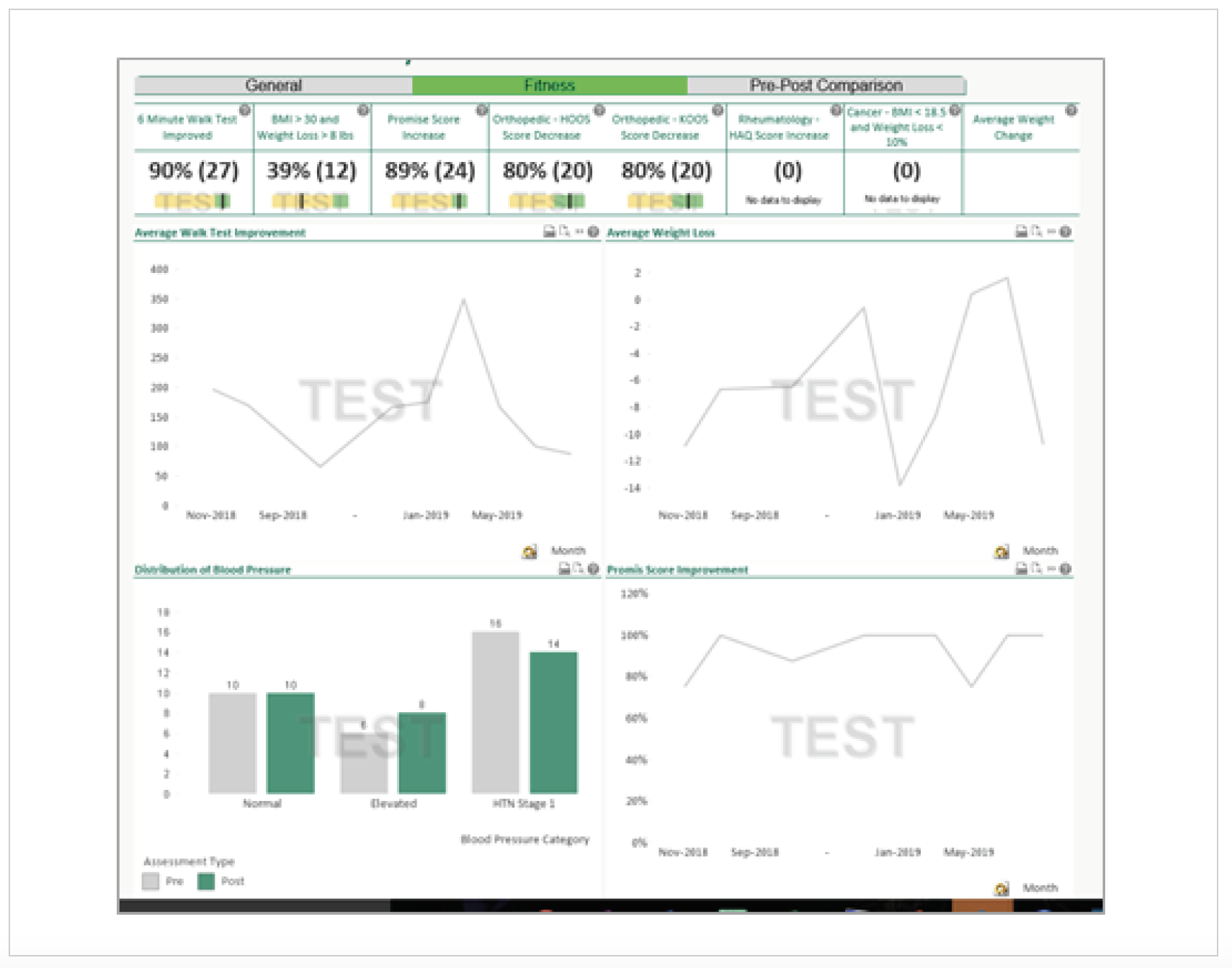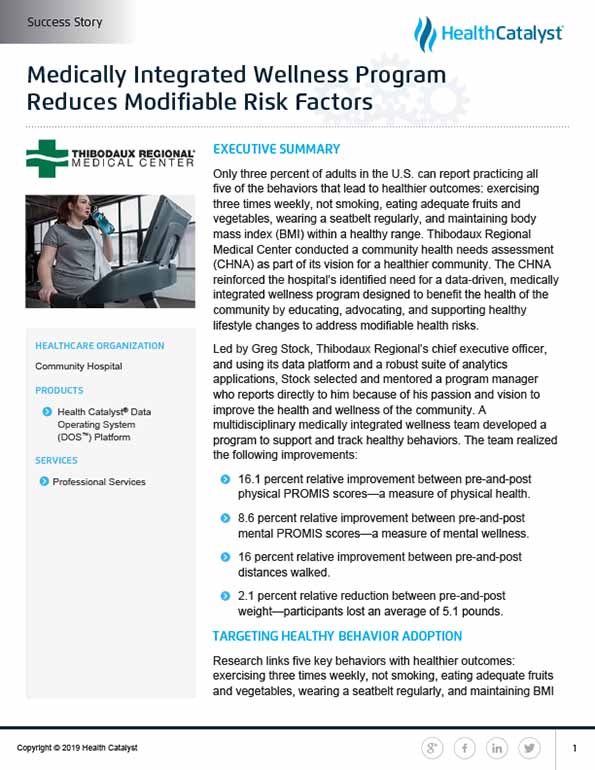Thibodaux Regional Medical Center conducted a community health needs assessment to support its vision for a healthier community. The assessment highlighted the need for a data-driven wellness program focused on education, advocacy, and healthy lifestyle changes to address modifiable health risks. Utilizing its data platform and analytics, Thibodaux Regional has been able to effectively track the outcomes of this program.
Only three percent of adults in the U.S. can report practicing all five of the behaviors that lead to healthier outcomes: exercising three times weekly, not smoking, eating adequate fruits and vegetables, wearing a seatbelt regularly, and maintaining body mass index (BMI) within a healthy range. Thibodaux Regional Medical Center conducted a community health needs assessment (CHNA) as part of its vision for a healthier community. The CHNA reinforced the hospital’s identified need for a data-driven, medically integrated wellness program designed to benefit the health of the community by educating, advocating, and supporting healthy lifestyle changes to address modifiable health risks.
Led by Greg Stock, Thibodaux Regional’s chief executive officer, and using its data platform and a robust suite of analytics applications, Stock selected and mentored a program manager who reports directly to him because of his passion and vision to improve the health and wellness of the community. A multidisciplinary medically integrated wellness team developed a program to support and track healthy behaviors.
Research links five key behaviors with healthier outcomes: exercising three times weekly, not smoking, eating adequate fruits and vegetables, wearing a seatbelt regularly, and maintaining BMI within a healthy range. Yet, only three percent of adults in the U.S. can report practicing all five behaviors.1,2
Thibodaux Regional’s mission is to provide the highest quality, most cost-effective healthcare services possible to the people of Thibodaux and the surrounding areas. Thibodaux Regional is committed to implementing actions that will improve the health and wellness of the residents in the community it serves.
Thibodaux Regional conducted a CHNA, as part of its vision for a healthier community. The survey identified significant issues related to nutrition, physical activity, and weight. Even with findings below national data, the health needs assessment recognized that 75 percent of adults did not receive advice from their healthcare provider regarding their weight in the past year.
Thibodaux Regional identified the need for a data-driven, medically integrated wellness program designed to benefit the health of the community by educating, advocating, and supporting healthy lifestyle changes to address modifiable health risks.
Thibodaux Regional’s CEO, Greg Stock, is highly committed to improving the health of the community. With validation from the CHNA, Stock selected and mentored a program manager who reports directly to him and challenged a multidisciplinary team to create a service to help community members address medical concerns, as well as work toward lifestyle changes aimed to reduce modifiable risk factors. Stock shared a clear vision of success and supported the team in the development of WellFit, a medically integrated wellness program as part of his overall vision of a healthier community.
Thibodaux Regional’s WellFit multidisciplinary team consists of a process improvement professional certified in lean six sigma, the wellness education center coordinator, the fitness center director, a fitness specialist, director of behavioral health, licensed social worker, physical rehabilitation director, cancer center director, cancer registered nurse navigator, financial analyst, and a physician champion for each care pathway. Team membership is adjusted to ensure key stakeholders take part in the decisions impacting their workflow.
The WellFit team developed twelve care pathways based on specific population needs. These pathways include surgery, orthopedics, functional fitness, cancer, rheumatology, heart, back and neck pain, diabetes, weight and lifestyle management, women’s health, mental health, and respiratory. A physician champion works closely with the team responsible for each pathway, approves pathway components and goals, and communicates to peers the need for, and benefits of, medically integrated WellFit services.
A healthcare provider refers participants to WellFit services. The program involves a nutritional history questionnaire, a tour of the fitness facility, and an intake appointment, which includes a registered nurse (RN) intake and fitness assessment. The RN completes a health history and identifies health risks such as smoking, diabetes, BMI outside of a healthy range, and a mental health assessment. WellFit uses Participant-Reported Outcomes Measurement Information Systems (PROMIS) to evaluate and monitor the physical, mental, and social health of participants. The RN offers smoking cessation resources and reviews nutrition goals and needs based on the provider referral. Registered dieticians provide one-to-one support. Participants who meet high-risk mental health criteria may receive a free screening with a licensed counselor, and additional mental health services are available if needed.
Along with the global WellFit goals, the orthopedic pathway has customized goals to track improvements in specific orthopedic measures. Participants who are referred to improve their health before a hip or knee replacement complete the Hip Disability and Osteoarthritis Outcome Score for Joint Replacement (HOOS JR) or the Knee Injury and Osteoarthritis Outcome Score for Joint Replacement (KOOS JR) surveys.
A degreed and certified fitness specialist conducts a fitness assessment, including a six-minute walk test at the start of the program and upon completion of the program. Participants receive a customized plan that includes nutrition and fitness education with unlimited access to Thibodaux Regional’s Fitness Center for the duration of the eight-week program. The plan may also consist of physical therapy and behavioral health services.
Participants attend a one-hour small group training class twice weekly. Each participant works on their individualized training plan. The trainer observes the group and provides coaching and support, adjusting plans as needed.
WellFit builds accountability through a variety of activities. During the eight-week program, the registered dietitian weighs each participant biweekly and offers support and feedback on nutrition logs. If participants miss a scheduled exercise session, a pathway navigator calls them to acknowledge the missed session and to reinforce the importance of attendance.
The multidisciplinary team meets weekly to discuss new participants, progress on existing participants, and follow-up on discharged participants who are not members of the fitness center. Upon completion of the program, participants may choose to become a Fitness Center member. Participants also receive quarterly accountability calls from an RN for the first six months following the program.
Thibodaux Regional leverages the Health Catalyst® Data Operating System (DOS™) and a robust suite of analytics applications, including a wellness analytics application to track outcomes (see Figure 1).

The wellness application provides data on WellFit and its participants on a daily basis, allowing the tracking and evaluation of pathway referrals, program completion rates, and progress toward individual and program goals. Thibodaux Regional broadened the analytics it used for WellFit to include all wellness services. Its Fitness Center members receive many of the same assessments used in the WellFit program.
By tracking Fitness Center metrics, WellFit participants who become members of the Fitness Center can have their lifestyle changes and impact on their health outcomes evaluated over time. This unique feature allows service coordinators to assess long-term effects of WellFit on lifestyle habits, weight, and fitness levels.
Thibodaux Regional’s data-driven approach to developing a physician-guided, participant-centered wellness program has quickly impacted the health of its community. Results include the following:
“The Wellness Center helps anchor my long-term vision for a healthier community that addresses wellness at every level. A state-of-the-art facility combined with programs and services such as prevention, education, and rehabilitation, combined with medically directed services were initiated in a big way.”
– Greg Stock, Chief Executive Officer, Thibodaux Regional Medical Center
Thibodaux Regional has received positive feedback from the community that its WellFit program is a valuable resource. The program team continues to meet and identify opportunities for further growth, improving community health one participant at a time.




